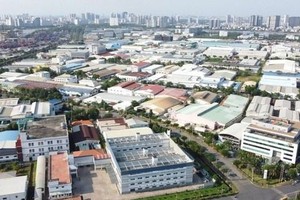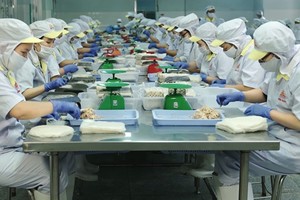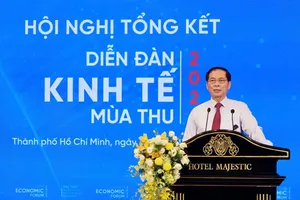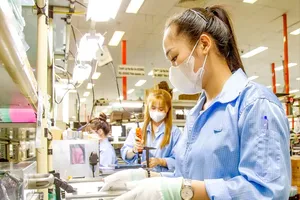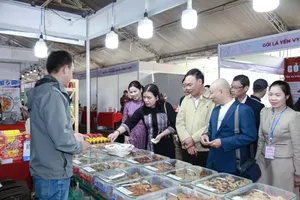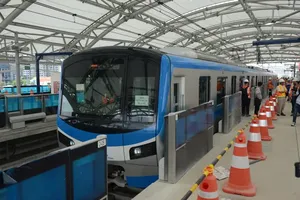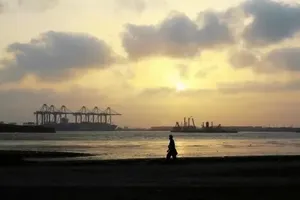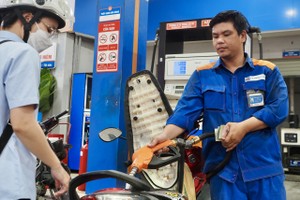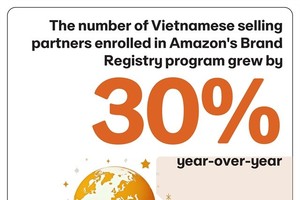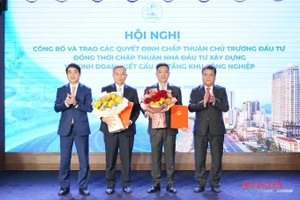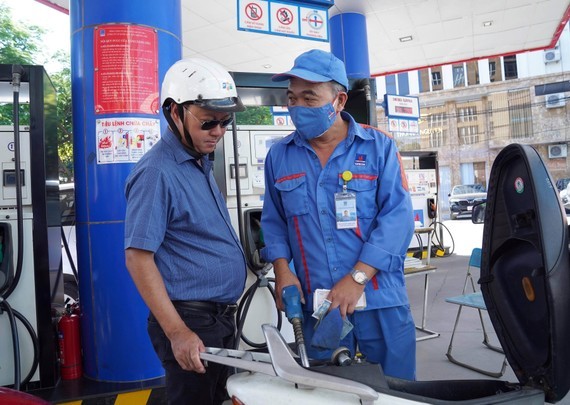 A customer refills his motorbike at a petrol station in Hanoi. (Photo: SGGP)
A customer refills his motorbike at a petrol station in Hanoi. (Photo: SGGP)
The petroleum import-export licenses of five key wholesalers have not been revoked yet
According to an employee of Petrol Station No.1 - a franchise of Petrolimex Saigon – in Nguyen Van Qua Street in District 12, on September 6, the number of customers refueling returned to normal. Petrol stations of private enterprises, which were warned by the authorities for stopping the sales of petrol products without a satisfactory reason, have operated normally. Petrol stations’ owners and agents confirmed that petrol products had been imported, but they were distributed at a limit and a discount of nearly zero Vietnamese dong.
“We do not have an abundant supply of petrol to hoard. Not to mention that, if petrol stations hoard goods, now they suffer a heavy loss because gasoline prices have just been lowered," said a petrol station's owner.
Meanwhile, the Inspector of the Ministry of Industry and Trade, on September 5, issued a decision to impose fines on 18 units, including key fuel traders and their subsidiaries, at the same time, and apply additional penalties of revocation of petroleum import and export licenses to five key fuel traders, including Dong Thap Petroleum Trading Joint Stock Company, Tin Nghia Petroleum Import and Export Joint Stock Company, Dong Phuong Petroleum Joint Stock Company, Hung Hau Petroleum Company Limited, and HCMC Petroleum Company Limited (Saigon Petro). Therefore, many enterprises and consumers expressed concern about a possible shortage of petroleum products for the market. Saigon Petro has sent a document to the Prime Minister and the Ministry of Industry and Trade proposing to cancel the decision to revoke its license to avoid affecting the business activities of the company and the supply of petroleum products for the domestic market. In HCMC alone, Saigon Petro has over 1,000 petrol retail stations.
Talking to SGGP Newspaper’s reporter, Mr. Bui Ngoc Bao, Chairman of the Vietnam Petroleum Association, said that the view of the association is that all violations must be handled according to the provisions of the law. As for enterprises being stripped of licenses, there will be two situations. First, only the petrol import-export license will be revoked, which means that enterprises can still do business in the domestic market. In the second situation, enterprises are deprived of all licenses, including import and domestic trading of petrol products. Thus, they will be paralyzed completely. According to Dr. Dinh Trong Thinh of the Academy of Finance, in the context of volatile petrol prices, it is not advisable to withdraw the license of key fuel wholesalers because it may lead to negative impacts on the market.
On the evening of September 6, at the regular Government press conference, Deputy Minister of Industry and Trade Do Thang Hai said, this issue had been reported to the Government. Violations must be strictly punished. However, the handling of violations must pay attention to the difficulties of enterprises and ensure the supply of petrol products to wholesalers so as not to affect production and business activities, as well as the demand of all people. In the immediate future, the Ministry of Industry and Trade would impose administrative penalties for violations, and the license would be revoked at an appropriate time.
The paradox of oil being more expensive than gasoline
Since the beginning of the year, oil prices have undergone 23 adjustments, including 15 increases and eight decreases. Currently, the prices of diesel and kerosene have risen by about VND7,000 per liter, up 38.12 percent, compared to the beginning of the year, while RON95 and E5 RON92 gasoline prices have declined to the same level at the beginning of January.
Mr. Trinh Quang Khanh, Standing Vice Chairman cum General Secretary of the Vietnam Petroleum Association, explained that the global price of finished oil products had an increase of 10-16 percent compared to the average price in the adjustment on August 22; diesel oil demand usually increases sharply in the last months of the year - the peak of production and consumption of goods. It is forecasted that in the next few months, the shortage of diesel oil may worsen as the cold season is coming, and the EU officially bans the import of fuel by sea from Russia from the beginning of 2023.
However, the fact that oil prices in Vietnam exceeded gasoline prices for the first time was partly due to the lack of flexibility in the management of the ministries of Industry and Trade and Finance. Lately, the ministries need more support from the Fuel Price Stabilization Fund so that diesel oil does not climb higher than gasoline. At the adjustment on September 5, the ministries released the fund at VND300 per liter to keep the diesel oil price down. However, in previous adjustments, diesel oil had to continuously set aside the fund at various high levels (the highest was VND850 per liter on August 22), leading to oil prices closely following gasoline prices.
Regarding whether to maintain the Fuel Price Stabilization Fund, Mr. Nguyen Duc Chi, Deputy Minister of Finance, said that the Ministry of Finance will listen to and absorb many opinions, thereby choosing the most reasonable plan and then report to competent authorities to ensure the highest interests of the economy.
According to an employee of Petrol Station No.1 - a franchise of Petrolimex Saigon – in Nguyen Van Qua Street in District 12, on September 6, the number of customers refueling returned to normal. Petrol stations of private enterprises, which were warned by the authorities for stopping the sales of petrol products without a satisfactory reason, have operated normally. Petrol stations’ owners and agents confirmed that petrol products had been imported, but they were distributed at a limit and a discount of nearly zero Vietnamese dong.
“We do not have an abundant supply of petrol to hoard. Not to mention that, if petrol stations hoard goods, now they suffer a heavy loss because gasoline prices have just been lowered," said a petrol station's owner.
Meanwhile, the Inspector of the Ministry of Industry and Trade, on September 5, issued a decision to impose fines on 18 units, including key fuel traders and their subsidiaries, at the same time, and apply additional penalties of revocation of petroleum import and export licenses to five key fuel traders, including Dong Thap Petroleum Trading Joint Stock Company, Tin Nghia Petroleum Import and Export Joint Stock Company, Dong Phuong Petroleum Joint Stock Company, Hung Hau Petroleum Company Limited, and HCMC Petroleum Company Limited (Saigon Petro). Therefore, many enterprises and consumers expressed concern about a possible shortage of petroleum products for the market. Saigon Petro has sent a document to the Prime Minister and the Ministry of Industry and Trade proposing to cancel the decision to revoke its license to avoid affecting the business activities of the company and the supply of petroleum products for the domestic market. In HCMC alone, Saigon Petro has over 1,000 petrol retail stations.
Talking to SGGP Newspaper’s reporter, Mr. Bui Ngoc Bao, Chairman of the Vietnam Petroleum Association, said that the view of the association is that all violations must be handled according to the provisions of the law. As for enterprises being stripped of licenses, there will be two situations. First, only the petrol import-export license will be revoked, which means that enterprises can still do business in the domestic market. In the second situation, enterprises are deprived of all licenses, including import and domestic trading of petrol products. Thus, they will be paralyzed completely. According to Dr. Dinh Trong Thinh of the Academy of Finance, in the context of volatile petrol prices, it is not advisable to withdraw the license of key fuel wholesalers because it may lead to negative impacts on the market.
On the evening of September 6, at the regular Government press conference, Deputy Minister of Industry and Trade Do Thang Hai said, this issue had been reported to the Government. Violations must be strictly punished. However, the handling of violations must pay attention to the difficulties of enterprises and ensure the supply of petrol products to wholesalers so as not to affect production and business activities, as well as the demand of all people. In the immediate future, the Ministry of Industry and Trade would impose administrative penalties for violations, and the license would be revoked at an appropriate time.
The paradox of oil being more expensive than gasoline
Since the beginning of the year, oil prices have undergone 23 adjustments, including 15 increases and eight decreases. Currently, the prices of diesel and kerosene have risen by about VND7,000 per liter, up 38.12 percent, compared to the beginning of the year, while RON95 and E5 RON92 gasoline prices have declined to the same level at the beginning of January.
Mr. Trinh Quang Khanh, Standing Vice Chairman cum General Secretary of the Vietnam Petroleum Association, explained that the global price of finished oil products had an increase of 10-16 percent compared to the average price in the adjustment on August 22; diesel oil demand usually increases sharply in the last months of the year - the peak of production and consumption of goods. It is forecasted that in the next few months, the shortage of diesel oil may worsen as the cold season is coming, and the EU officially bans the import of fuel by sea from Russia from the beginning of 2023.
However, the fact that oil prices in Vietnam exceeded gasoline prices for the first time was partly due to the lack of flexibility in the management of the ministries of Industry and Trade and Finance. Lately, the ministries need more support from the Fuel Price Stabilization Fund so that diesel oil does not climb higher than gasoline. At the adjustment on September 5, the ministries released the fund at VND300 per liter to keep the diesel oil price down. However, in previous adjustments, diesel oil had to continuously set aside the fund at various high levels (the highest was VND850 per liter on August 22), leading to oil prices closely following gasoline prices.
Regarding whether to maintain the Fuel Price Stabilization Fund, Mr. Nguyen Duc Chi, Deputy Minister of Finance, said that the Ministry of Finance will listen to and absorb many opinions, thereby choosing the most reasonable plan and then report to competent authorities to ensure the highest interests of the economy.
Some experts also suggested that the Ministry of Industry and Trade should soon study and request the Government to amend Decree No.95/2021/ND-CP on petrol and oil trading, removing the requirement that key fuel importers must meet the conditions of having at least 40 petroleum general agents or retail agents or fuel retail franchisees. This requirement will be a barrier for new enterprises to enter the market because not all young businesses can afford to build the whole system. At the same time, it is necessary to consider opening the door for foreign petroleum trading enterprises to operate to increase competitiveness and make the market healthy.
